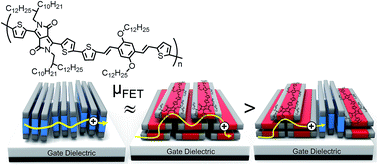Control of consistent ordering in π-conjugated polymer films for organic field-effect transistor applications†
Abstract
A novel conjugated copolymer, pDPP-(TV)2B-2DO, including donor (D) and acceptor (A) blocks of (TV)2B-2DO, 1,4-bis((E)-2-(thiophen-2-yl)vinyl)benzene with dodecyloxy moieties and diketopyrrolopyrrole (DPP) derivatives, respectively, was synthesized by Stille-coupling polymerization. The 60 kDa pDPP-(TV)2B-2DO showed good solubility in organic solvents and strong molecular interaction during film procedures. Semiconducting thin films were spun-cast on polymer-treated SiO2 from chloroform and annealed at temperatures ranging from 150 to 300 °C for 1 h. The electrical properties of these films in organic field-effect transistors (OFETs) were evaluated and correlated with π-conjugated ordering of the pDPP-(TV)2B-2DO, before and after annealing. Featureless aggregates of the face-on copolymer by the bulky B-2DO in the D block were dominant in the as-spun film and transformed into ordered rods or fibrils containing highly ordered edge-on polymers on the substrates after annealing. In terms of π-conjugated ordering, the as-spun and 250 °C-annealed pDPP-(TV)2B-2DO films contained highly-consistent chains with face-on and edge-on structures, respectively. The resulting OFETs yielded similar field-effect mobilities of 0.07 and 0.08 cm2 V−1 s−1, respectively, as well as on–off current ratios greater than 106 and a threshold voltage near 0 V. Therefore, the π-overlap of edge-on semiconducting polymers on gate dielectrics was not necessary to enhance the electrical performance of OFETs, but the high consistency in chain ordering was very important.


 Please wait while we load your content...
Please wait while we load your content...